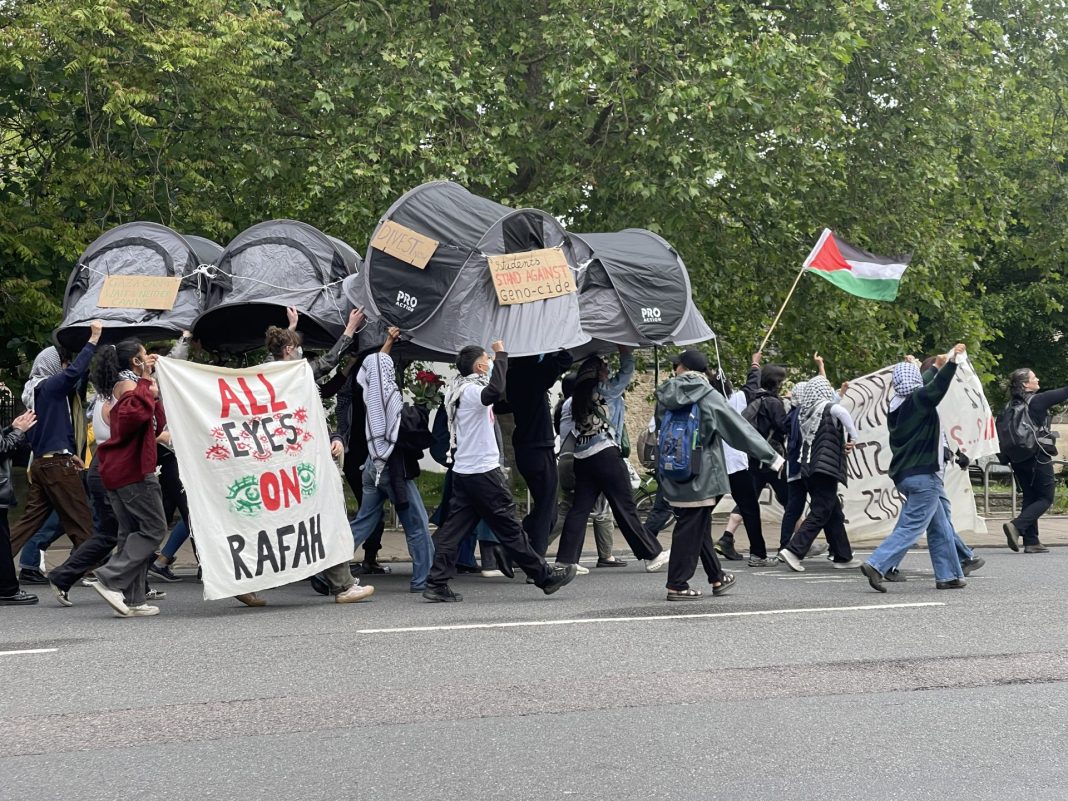Oxford University clarified rules for student protests, encouraging them in an email to “make Oxford a welcoming and inclusive place” and to keep demonstrations “within the limits of the law.” Oxford Action for Palestine (OA4P) argues that some rules have changed to suppress protest.
The rules prohibit protesters from interruption of teaching, occupation of University property, disobeying a reasonable instruction from Proctors, or failing to identify oneself to any University staff. Breaching any provisions may incur punishments such as warnings, fines, or suspension.
Previously, the same rules were only found in Statute XI on University discipline, but now they have been copied to the Guidance on Demonstrations or Protests page.
The University also published a Code of Practice on Freedom of Speech, which supersedes the Code of Practice on Meetings and Events. Previously events required a seven-day notification period, which has now lengthened to 20 days. The new code added that an event may be refused permission if speakers can be reasonably believed to express views “contrary to law” or “highly controversial” – language not found in the older code.
A University spokesperson told Cherwell that the change in language is only for clarification, so policies “remain unchanged and will be enforced”.
The spokesperson said: “The University has set out existing policies that govern how demonstrations and protests within our community should be carried out. This will ensure any protest can be conducted safely and within University rules. When protesters have breached our statutes the Proctors have taken, and will take, disciplinary action.”
When the University put several Statute XI amendments to a Congregation vote in June, students circulated a brief that criticised the new rules as “illiberal, vague, and impractical” while academics submitted a resolution opposing the amendments. The University then withdrew the proposed amendments and are in the process of proposing new ones.
OA4P, which set up an encampment and organised months of protest last year, believes that some rules have changed with the new wording.
An OA4P spokesperson told Cherwell: “The University has now unilaterally implemented restrictions which were rejected by students, faculty, and staff – many of which are even stricter than those attempted in June. By ignoring community input, the Administration has failed its obligation to meaningfully engage with the University community and instead seeks to police student and staff freedoms of expression.
“Protest is a vital and historically effective way to enact change. It alarms us that the University would seek to suppress this central avenue for students to make themselves heard.”
The University’s email came amid further protest by Oxford Action For Palestine (OA4P) during the September Open Day, during which demonstrators held Palestinian flags during seminars for prospective students and demanded that the University “sever all ties with Israeli genocide”.
Meanwhile, the University has launched a new scheme for Palestinian students in support of “the advancement of learning and rebuilding of higher education in Gaza and the West Bank”. The Palestine Crisis Scholarship Scheme would see graduate students with an offer to study a one-year full time Master’s degree supported by a full scholarship, including a grant for living costs. The University has also extended access to the Bodleian libraries and University Press assets to scholars in the region.


